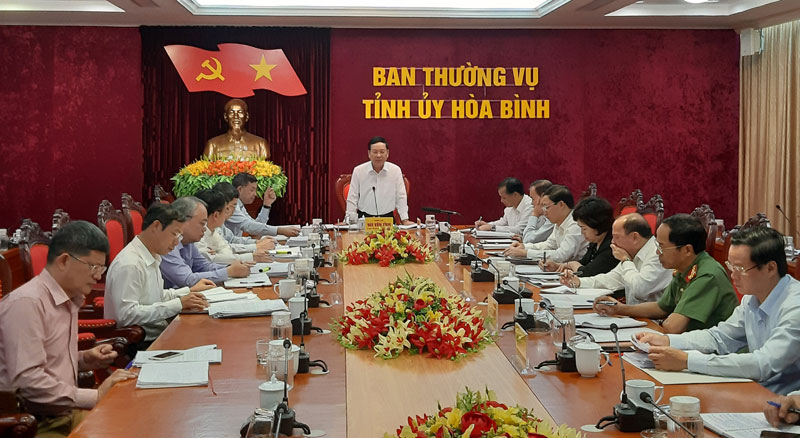


 Bui Van Tinh, member
of the Party Central Committee and Secretary of the provincial Party Committee speaks
at the meeting.
Bui Van Tinh, member
of the Party Central Committee and Secretary of the provincial Party Committee speaks
at the meeting. After four years of implementing the State budget collection target in line with the Resolution of the provincial Party Congress, the province achieved positive results in the task.
In 2019, the State budget collection is expected to reach 4 trillion VND, equal to 130 percent of the estimate required by the Government and 105 percent of the target set by the provincial People's Council, up 18 percent compared to 2018.
In the period of 2015-2019, the province’s average growth of State budget collection reached 12.5 percent, 4.5 percent lower than the 17-percent average growth target set in the 16th provincial Party Congress’s Resolution.
On the basis of reviewing and assessing potential, and detecting solutions to increase State budget collection, especially collecting revenues from land use right auctions, it is expected that by 2002, the province will complete the State budget collection target of 5 trillion VND set in the Resolution of the provincial Party Congress.
According to the report of the Party civil affairs board of the provincial People’s Committee, in 2015-2018, the provincial authorities issued many mechanisms and allocated investment resources for agricultural development and new-style rural area building. Despite significant results attained, the quality of product development plans and agricultural restructuring schemes is not high. The linkage between production and consumption of agricultural products remains poor with small scale and unsustainability. Meanwhile, very few enterprises have invested in agriculture, especially hi-tech agriculture, the report added.
Hoa Binh’s annual average economic growth is hoped to reach between 4-4.5 percent. By 2025, the annual revenue from per hectare of cultivation land and aquaculture area is expected to hit 200 million VND and 225 million VND per year, respectively. Meanwhile, the locality’s average annual per capita income in rural areas is hoped to stand at 50 million VND. The locality also aims to have 40 percent of districts and 70 percent of communes recognized as new-style rural areas.
Concluding the meeting, Tinh highly valued the province agricultural and rural development achievements, and asked for more measures to promote sustainable agricultural and rural development.
He stressed that it is necessary to review, make planning and build a provincial soil map on agriculture, thus defining key crops, organising production in association with product consumption, strictly managing land resources, the environment and input materials in agricultural production, developing high-tech husbandry, promoting aquaculture and forest-based economy development in connection with processing industry and sustainable protection of natural resources and ecological environment, and improving the living standards for local farmers.
He requested the Party civil affairs board of the provincial People’s Committee to swiftly complete its report for the early issuance of a conclusion of the provincial Party Committee’s Standing Board, which will serve as an basis for agencies, sectors and localities to build political documents, towards well implementing Resolution No. 26 of the Party Central Committee on agriculture, farmers and rural areas.
Regarding the target of State budget collection, the leader asked members of the provincial Party Committee’s Standing Board, and the Party civil affairs board of the provincial People’s Committee to raise the sense of responsibility and focus on directing the implementation of solutions to increase the State budget collection, focusing on raising revenue from land use right auctions, and collecting tax arrears, towards fulfilling the target set in the Resolution of the 16th provincial Party Congress./.